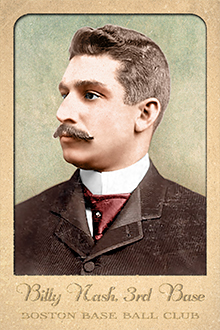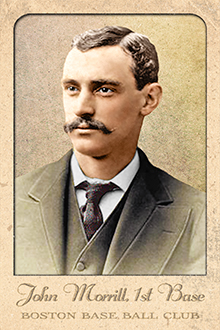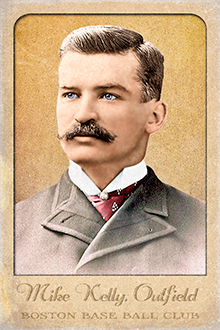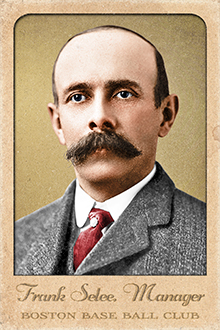
- Series: Pioneer Portraits II: 1875-1899
- City: Boston
- Team: Beaneaters
- League: National League
- Hall: National Baseball Hall of Fame
Frank Gibson Selee (1859-1909) was on the way to becoming the greatest baseball manager of all time when tuberculosis drove him out of the game he had mastered. For sixteen years, 1890-1905, Selee molded teams that found ways to win. He placed players on the field like a chess grandmaster, using their talents in ways they didn’t even recognize in themselves. He treated his players fairly and as men, not cogs in a machine. And they responded to him, setting records for games won. Frank’s Beaneaters won five titles. He went out to Chicago and rebuilt a floundering squad, recruiting the likes of Mordecai Brown and carefully putting together the pieces of a legendary infield. Illness forced him to pass the baton to Frank Chance, but it is clear that Chicago’s four pennants were a testament to Selee’s managerial acumen.
- Frank’s genius was in organizing men to get the best results from them. His players hit for power unlike any until the Babe’s Yankees yet also innovated many of the finesse plays: hit and run, hitting behind the runner, double-plays
- A dozen of Selee’s charges would precede him into Cooperstown
- Elected to Hall of Fame: 1999
- Series: Pioneer Portraits II: 1875-1899
- City: Boston
- Team: Beaneaters
- League: National League
William Mitchell Nash (1865-1929) played for 15 years as a third baseman, primarily in Boston. He managed the Phillies in ’96. He achieved a lifetime BA of .275 with a high of .295 for the ’87 Beaneaters. As manager, Nash scouted and recruited Nap Lajoie to Philadelphia.
- Bill James ranked Nash #49 all-time third basemen
- Sporting Life touted his $7,500 total compensation in ’91 as money well-spent
- Series: Pioneer Portraits II: 1875-1899
- City: Boston
- Team: Beaneaters
- League: National League
John Francis Morrill (1855-1932) was a successful player/manager, primarily for the Beaneaters, in a career spanning 1876-90. His team’s third pennant came in ’83, the year after he took over as manager at Boston. “Honest John” hit .319, played six positions, and piloted the club to victory, winning 33 of its final 44 games.
- Batted .260 over his 15 year career
- Received a 5-minute ovation upon his return to Boston after a brief stint w/Washington
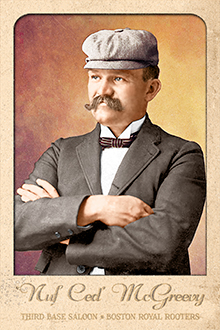
- Series: Pioneer Portraits II: 1875-1899
- City: Boston
Michael “Nuf Ced” McGreevy (1865-1943) was the leader of the Royal Rooters, Boston’s premier baseball and drinking club, based at McGreevy’s Third Base Saloon “1200 steps from Fenway Park.” When arguments of Braves vs. Red Sox (Americans) broke out, he ended the fight by shouting “Nuf Ced!” An ardent crank of the Boston Beaneaters for nearly two decades, McGreevy appears to have pledged his allegiance to the Red Sox for two primary reasons: Jimmy Collins, his favorite Beaneater, jumped to the Boston Americans in 1901, the inaugural season of the American League; and Ban Johnson's new league offered cheaper tickets, enabling McGreevy and his patrons to attend more games. This switch had an enormous impact on the fortunes of professional baseball in Boston, perhaps positing McGreevy as the true Father of Red Sox Nation and foreshadowing the (Beaneaters) Braves' move to Milwaukee 53 years later.
- Opened in 1894, the Third Base Saloon got its name to designate it as “the last stop before home”
- McGreevy was an avid collector who decorated his saloon with wall-to-wall cabinet cards, photographs and game used memorabilia
- In his SABR bio on McGreevy, Peter Nash called the Third Base Saloon, "baseball's first true museum"
- When prohibition forced the closure of his saloon, McGreevy donated his collection to the Boston Public Library
- Series: Pioneer Portraits II: 1875-1899
- City: Boston
- Team: Beaneaters
- League: National League
- Hall: National Baseball Hall of Fame
Michael Kelly (1857-1894) was one of the great stars of the 1880s. He inspired America’s first pop record (“Slide, Kelly, Slide!”) in 1889 with a 1927 movie to follow. The “Chicago Slide” was copied by his White Stockings teammates, a “combination slide, twist and dodge” that allowed the team to “get away with hundreds of stolen bases when really they should have been touched out easily” per the Tribune’s Hugh Fullerton in 1906. A catcher, right-fielder and manager over 16 years, he popularized the hit & run.
- A pioneer athlete in vaudeville, $10,000 Kelly also popularized autograph signing
- First major leaguer to publish his autobiography (1888)
- Elected to Hall of Fame: 1945

